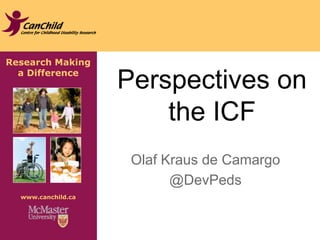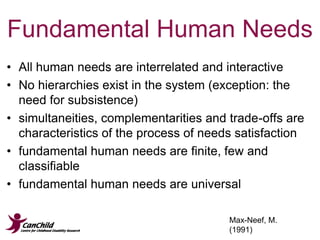The ICF from different angles
- 1. Research Making a Difference www.canchild.ca Perspectives on the ICF Olaf Kraus de Camargo @DevPeds
- 2. Perspectives on the ICF
- 4. The Complexity of Needs • Hierarchy of Needs (Maslow) • Dialectic relation of needs and satisfiers (Max- Neef)
- 5. Hierarchical Order http://elp.ecml.at/IMPEL/Documents/Keyissuesofimplementation/ta bid/118/%20language/en-GB/Default.aspx
- 6. Hierarchical Order • Hierarchy of Needs (Maslow) Impairment Disability Handicap http://elp.ecml.at/IMPEL/Documents/Keyissuesofimplementation/ta bid/118/%20language/en-GB/Default.aspx
- 7. System of Needs • Dialectic relation of needs and satisfiers (Max- Neef) Being → Having → Doing → Interacting → Health Services http://ecocommunes.wordpress.com/2011/10/05/manfred-max-neef-les-besoins- humains-fondamentaux/ Education
- 8. Fundamental Human Needs • All human needs are interrelated and interactive • No hierarchies exist in the system (exception: the need for subsistence) • simultaneities, complementarities and trade-offs are characteristics of the process of needs satisfaction • fundamental human needs are finite, few and classifiable • fundamental human needs are universal Max-Neef, M. (1991)
- 9. Needs • Existencial needs: Being, Having, Doing, Interacting • Axiological needs: Subsistence, Protection, Affection, Understanding, Participation, Idleness, Creation, Identity, Freedom Max-Neef, M. (1991)
- 10. Traditional Reading of the ICF
- 11. Person-centred Reading of the ICF
- 12. First contact ? ? ?
- 13. Getting to know the person Who are you? What do/would you like to do?
- 14. Where and how do you live?
- 15. We can give you a diagnosis!
- 16. Now, let’s focus on what you want!
- 17. Core-sets ‚û°diagnosis-specific item selection ‚û°improve practicability ‚û°might restrict individualized approach ‚û°children usually do not have only one diagnosis to choose a core-set
Editor's Notes
- Diagnosis should be called health condition and the lines should have arrows in both directions
- Subsistence: Food, shelter, work Protection: insurance, savings, social security, health system, rights, family, work Affection: friendships, partnerships, relation with nature Understanding: literature, teacher, education policies, communication policies Participation: rights, responsibilities, duties, privileges, work Idleness: games, spectacles, clubs, parties, peace of mind Creation: abilities, skills, method, work Identity: Symbols, language, religion, habits, customs, reference groups, sexuality, values, norms, historical memory, work Freedom: Equal rights

















